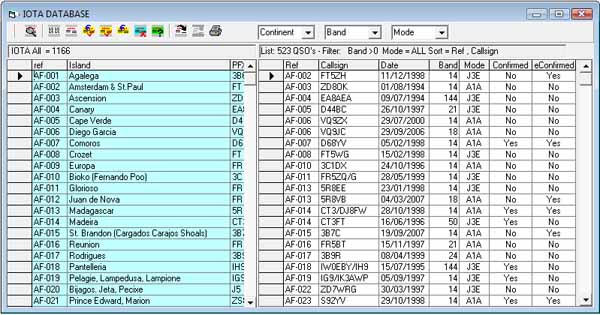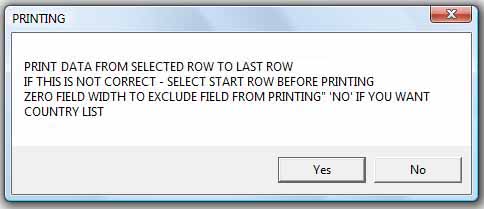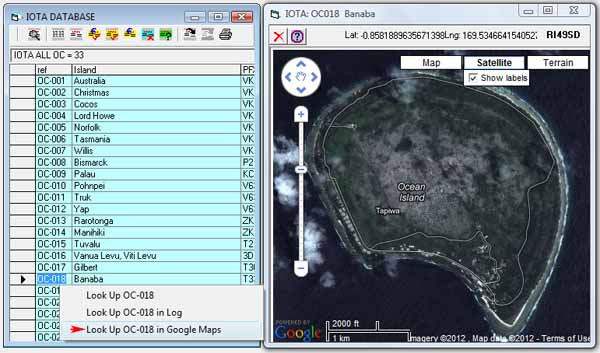|
The Databases - IOTA DATABASE
The IOTA database contains island names and references for the 'Islands On The Air' (IOTA) award, as defined by the award program and supported by the RSGB.
All islands and references are listed, and the database allows tracking of worked and confirmed status of logged QSO and other related functions throughout the software.
The IOTA database QSO list will be updated automatically when a new IOTA Ref. is worked or
confirmed in the Log with each NEW band/mode during the logging input.
Only ONE QSO from the Log is added to the IOTA database for each new IOTA ref./band/mode, thus not every QSO is added to the IOTA database.
N.B. The IOTA database is multi band/mode however at this time IOTA program does not support multi band/mode but this is included for future expansion.
To enable the update function to operate, the correct syntax MUST be entered into the Log 'Remarks' field.
The normal "IOTA EU-005" format can be used, but severaal different reference formats are allowed, e.g. "EU005"; "EU05" EU-05", but in all cases must be preceeded by "IOTA and space character as in example.
The IOTA database can be viewed and queried directly:
menu/Databases/IOTA/View
The IOTA database window.

If you have no interest in IOTA and don't require IOTA status reports, the function can be disabled with menu/Database/IOTA/Auto Check.
The ‘white’ list displays IOTA ref. and details of QSO entered in the IOTA database, only one entry per band/mode.
Both island and QSO list displays are modified by the last selected filter,
e.g. worked, confirmed, etc., using the appropriate toolbar buttons.
Island and QSO lists interact accordingly.
The left ‘blue’ columns lists all current IOTA references, this list will be modified
to reflect any filtering by the toolbar query buttons.
The second toolbar button will list deleted IOTA references, this has no practical usage other than being able to view the deleted references in the IOTA database.
A summary of the query and results are displayed at the top of each list.
The summary will inform of total IOTA worked/confimed depending on what filters are set.
The Toolbar Query Icons.

| 1 | All | All IOTA and all QSO entered in the IOTA database. |
| 2 | Worked | All IOTA worked and related QSO in the IOTA database. |
| 3 | Any Confirmed | All IOTA confirmed and related QSO in the IOTA database. |
| 4 | QSL Confirmed | All IOTA confirmed by QSL and related QSO in the IOTA database. |
| 5 | eConfirmed** | All IOTA confirmed by LoTW** and related QSO in the IOTA database. |
| 6 | Worked/Not Confirmed | All IOTA worked but not confirmed and QSO awaiting confirmation. |
| 7 | Wanted | All IOTA wanted, no QSOs are listed in the IOTA databse. |
** N.B. The IOTA award does not accept LoTW or other electronic confirmations at this time!
Further filters can be applied using the toolbar drop-own continent, band and mode filters.
The band and mode filter lists mirror the contents of the Log drop-down lists (band/mode)
If a required band or mode is not present in the IOTA filter list, it must be added to the Log band/mode list.
menu/Options/Settings/Custom lists
'Digi' modes (e.g PSK, RTTY etc) can be queried individually or as a group "All Digi" modes, this is done by routines which automatically add a trailing space after the
Digi mode when added to the IOTA database, e.g."PSK "
This must also be observed when entering or editing data modes manually in the IOTA QSO list.
Toolbar option #1 will find the selected QSO corresponding in the Log.
Toolbar option #9 will export the QSO list as a text delimited file.
Toolbar option #10 will export the QSO list in a UPF file format specific for the IOTAMem4Win software.
'IOTAMem4Win' is a IOTA management software, IOTAMem v1.5 or later must be used.
The UPF file is a simple ASCII text list of IOTA and callsign worked.
The file is saved in location ..\Winlog32\Output\*mycallsign*.UPF
Toolbar option #11 will print the QSO list and/or the country list.

Click 'Yes' to print the QSO list; click 'No' for a further option to print the island reference list.
Fields not required in the print-out can be ignored by narrowing the field width by dragging the column seperators to zero (hidden).
The IOTA database can also be updated with the Log Check Robot (LCR)
It will be necessary to use the Log Check Robot after importing from another Log program.
Speed logging or contest operation do not update the IOTA database so it will be necessary to run the Log Check Robot
through any new QSOs added during these periods.
A separate help section deals with the Log Check Robot.
The software also queries the IOTA database for status of DXCluster spots; right mouse-click menu look-up IOTA and other functions.
Special Functions
Maps
This feature is available only to registered users who have the Google Maps interface (API) functioning.
A brilliant add-on to the IOTA database which enables display of all the IOTA islands and island groups using the Google Maps API, including satellite view.

To display the corresponding map, right-click the IOTA ref. number.
The example shows Banaba (Ocean) Island, OC-018 using the API 'satellite' view.
See the separate help section for details and requirements of the Google maps API interface.
The right-click menu enables a look-up of all QSO in the Log for the selected IOTA.
Maintenance.
Removing a QSO from the IOTA database.
Click cursor on the QSO callsign in the 'worked' list to select it.
Click cursor on the adjacent left grey |>| pointer column which will select the complete line.
Press the keyboard DELETE key to complete the deletion.
N.B. This does NOT delete the associated QSO from the Log database.
Occasionally IOTA adds or removes entities from the award program, updates are usually provided when this occurs.
|